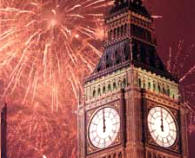|

Go to:-
Christmas /New year Recipes
| Parties
|
Party Food and Cocktails
|
Chinese New Year
Celebrating
the new year is probably the oldest of all festivities dating back to around
4000 ago in Babylon, although it has only been celebrated on 1st January
for about 400 years in the West. Prior to that it was celebrated much
later in the year, at the beginning of Spring, to herald new birth and a new
season (agriculturally speaking). Even
when the Roman Senate declared that January 1st be the start of the New Year
back in 153BC, the Catholic Church condemned the festivities as pagan right up
to the Middle Ages.
The
tradition of making new year resolutions also dates back to the early
Babylonians. How times change; whilst modern resolutions may include the promise
to stop swearing or give up smoking, the early Babylonian's most popular
resolution was to return borrowed farm equipment!
In
many countries, traditional New Year's foods are 'einf' shaped or round. This
symbolises the end of the one year with the seamless beginning of the next.
The
song, "Auld Lang Syne," is traditionally sung at the stroke of
midnight in almost every English-speaking country in the world and is reputed to
have been partially written by Robert Burns in the 1700's. "Auld Lang Syne"
literally means "old long ago" ...in other words "the good old
days." You can find the traditional words to Auld Lang Syne
here.
Different
cultures celebrate the New Year at other times of the year, but the sentiment is
still pretty much the same the world over. Below are some examples of recipes
traditionally served at the new year in various countries and how to say Happy
New Year in that language.
Chinese:
"Chu Shen Tan"
The
Chinese New Years falls on varying dates usually during January or February. For Chinese New Year, it is a tradition
for families to come together on New Year's Eve and make jiaozi (Chinese
dumplings) for the next day's feast. The
dumplings are said to resemble old Chinese money and are served to bring wealth
and good luck in the new year.
Chinese New Year Recipe:
Jiaozi
HT HD Chinese 45mins plus chilling
Dutch:
"Gullukkig Niuw Jaar"
Oliebollen
are donuts traditionally eaten at New Year in Holland. Because the Dutch
believe you should eat the old year out and the new year in, a family new years
eve is often spent drinking mulled wine and nibbling on these delicious
donuts whilst playing games.
Dutch New
Year Recipe:
Oliebollen
HT CD CBF Dutch 35mins plus standing
|

